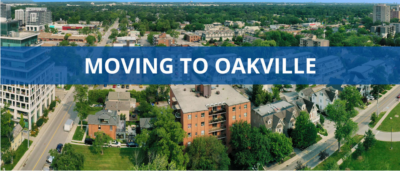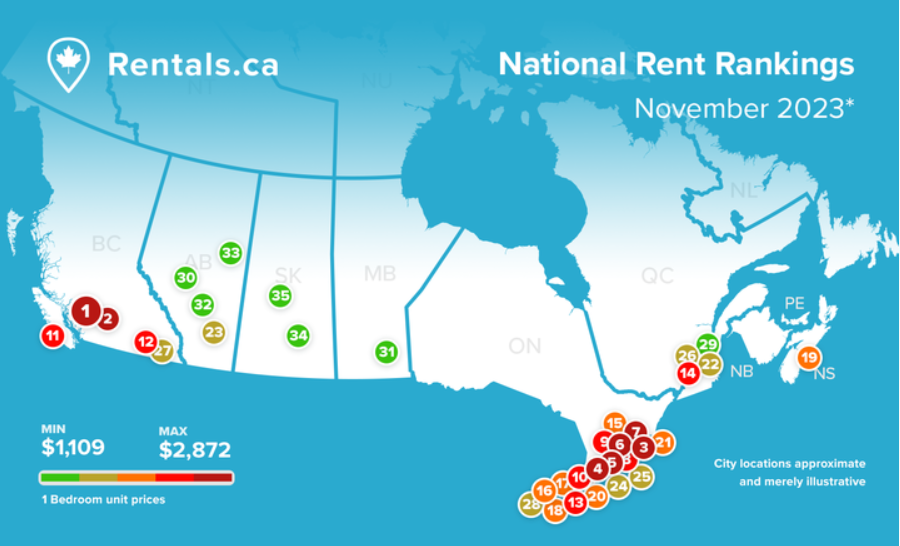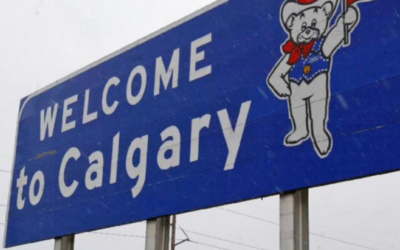 By Staff
By Staff
November 13th, 2023
BURLINGTON, ON
The National Rent Report charts and analyzes of monthly, quarterly and annual rates and trends in the rental market on a national, provincial, and municipal level put together by Urbanation with data at Rentals.ca was released earlier today.
Toronto finished third on the list of 35 cities for average monthly rent in October for a one-bedroom at $2,607 and second for average monthly rent for a two-bedroom at $3,424.
Other Greater Toronto Area cities and areas include:
 Oakville came in fourth on the list in October with an average monthly rent for a one-bedroom at $2,524 and $3,337 for a two-bedroom.
Oakville came in fourth on the list in October with an average monthly rent for a one-bedroom at $2,524 and $3,337 for a two-bedroom.
Year over year, average monthly rent in October for a one-bedroom in Oakville was up 19.7% and up 23.5% for a two-bedroom.
Mississauga came in fifth on the list of 35 cities for average monthly rent in October for a one-bedroom at $2,352 and $2,851 for a two-bedroom.
Year over year, average monthly rent in October for a one-bedroom in Mississauga was up 11.9 per cent and up 15.6 per cent for a two-bedroom.
Richmond Hill came in sixth for average monthly rent in October for a one-bedroom at $2,326 and $2,685 for a two bedroom.
Year over year, the average monthly rent in October for a one-bedroom in Richmond Hill was up 16.5 per cent and up 10.8% per cent for a two-bedroom.
Etobicoke finished eighth on the list for average monthly rent in October for a one-bedroom at $2,292 and fifth for average monthly rent for a two-bedroom at $2,909.
Year over year, average monthly rent in October for a one-bedroom in Etobicoke was up 3.4 per cent and up 0.3 per cent for a two-bedroom.
 Asking Rents in Canada Increased by $175 in the Past 6 Months
Asking Rents in Canada Increased by $175 in the Past 6 Months
For the sixth month in a row, average asking rents in Canada hit a new high, averaging $2,178 according to Rentals.ca and Urbanation’s latest National Rent Report. Over the past six months, average rents increased by 8.8%, equivalent to $175 per month.
In October, the annual rate of rent growth in Canada stood at 9.9%, a modest slowing from the 11.1% annual pace in September. However, it marked the second-fastest annual increase over the past seven months. Additionally, average asking rents experienced a 1.4% month-over-month increase in October, showing somewhat slower growth than the monthly gains of 1.5% in September and 1.8% in August. This deceleration can be attributed to seasonal factors influencing the rental market.
“While headline rent inflation for Canada continued to run hot in October, the slowing of rents in cities such as Toronto and Vancouver was significant, showing that affordability challenges are causing renters to shift into less expensive markets,” said Shaun Hildebrand, president of Urbanation.
For the first time, two-bedroom apartment rents surpassed $2,300 in October, registering at $2,311. One-bedroom apartments experienced the fastest annual growth, with rents increasing by 14.1%. With an average of $1,538, studio apartment asking rents rose by 12.0% compared to a year ago, while three-bedroom apartment rents increased annually by 8.9% to reach an average of $2,532.
Alberta, Quebec, and Nova Scotia saw concentrated rent inflation driven by strong population growth and increased supply entering the market at higher rents. Alberta experienced a 16.4% year-over-year increase in average asking rents, leading the provinces in growth. In Nova Scotia, average asking rents for apartments increased 13.6% from a year ago to $2,097, with annual growth following close behind in Quebec at 13.3%, where average asking rents reached $1,977.
 For the ninth straight month, Calgary was the leader in annual rent growth for apartments in Canada’s largest cities with a 14.7% annual increase. Montreal maintained the second spot with annual rent growth of 10.2%, which averaged $2,046 in October. Toronto however, witnessed a year-over-year decline of 0.8% in asking rents, the first annual decrease since August 2021.
For the ninth straight month, Calgary was the leader in annual rent growth for apartments in Canada’s largest cities with a 14.7% annual increase. Montreal maintained the second spot with annual rent growth of 10.2%, which averaged $2,046 in October. Toronto however, witnessed a year-over-year decline of 0.8% in asking rents, the first annual decrease since August 2021.
B.C. maintained the top spot on the list of the most expensive small- and medium-sized markets, with North Vancouver, Coquitlam, and Richmond leading the way. Côte Saint-Luc ( Montreal suburb) witnessed the highest annual growth among small- and mid-sized markets, with a staggering 36.6% increase.
Listings for shared accommodations in B.C., Alberta, Ontario, and Quebec increased by 42% from the previous year. Average asking rents for roommate rentals grew by 19%, reaching $964 per month.
Rentals.ca Network data is analyzed and the report is written by Urbanation, a Toronto-based real estate research firm providing in-depth market analysis and consulting services since 1981.
*The data includes single-detached homes, semi-detached homes, townhouses, condominium apartments, rental apartments and basement apartments (outlier listings are removed, as are single-room rentals.)




















The subject of this article is certainly relevant. We should in Burlington be worried about inflation of rents in this era of escalating costs in so many aspects of keeping a roof over our heads and food on our tables.
I see how Toronto, Oakville, Etobicoke and Mississauga are faring in the article, but not Burlington. Can you please tell us how Burlington is doing?